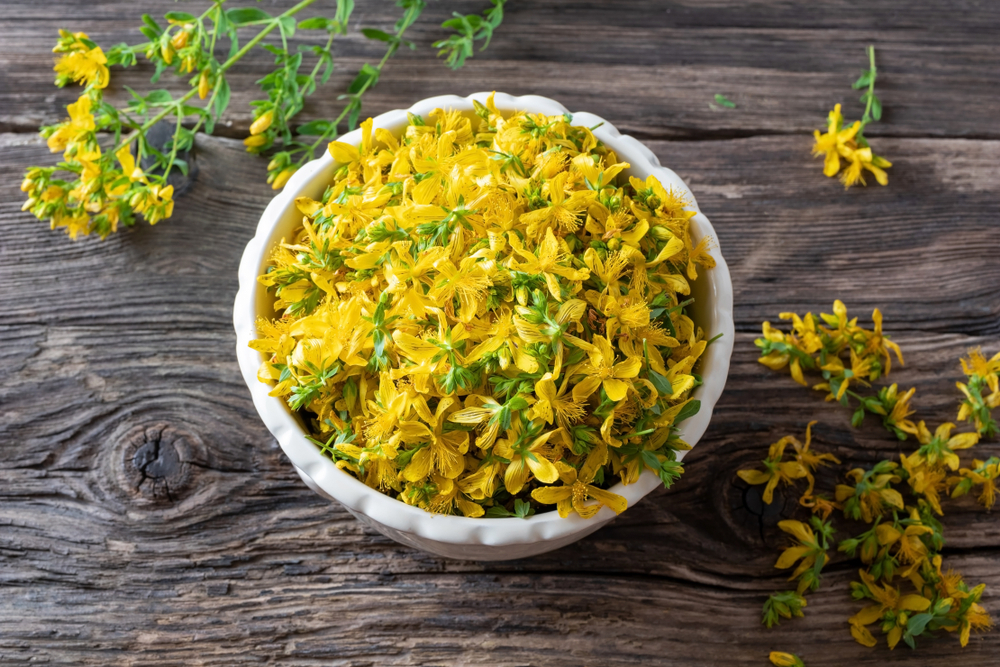St. John’s Wort (Hypericum perforatum) is a flowering plant that has been used for centuries as a natural remedy for a variety of ailments, particularly those related to mental health. Known for its bright yellow flowers and numerous medicinal properties, this herb has gained popularity as a natural alternative for managing depression, anxiety, and other conditions.
In this blog post, we’ll explore the benefits, properties, and contraindications of St. John’s Wort, as well as how to use it safely.
What is St. John’s Wort?
St. John’s Wort is a perennial herb native to Europe but now found worldwide. Its name comes from its traditional harvesting time around St. John’s Day (June 24th) and the word “wort,” an old English term for plant. The plant’s flowers and leaves contain bioactive compounds that contribute to its therapeutic effects. Historically, it has been used to treat wounds, nerve pain, and mood disorders.
Benefits of St. John’s Wort
- Supports Mental Health
St. John’s Wort is most well-known for its ability to alleviate symptoms of mild to moderate depression. Studies suggest that it may be as effective as certain prescription antidepressants, with fewer side effects for some individuals. - Reduces Anxiety and Stress
The herb has calming properties that can help reduce anxiety, stress, and mood swings. It is often used to promote emotional balance and well-being. - Improves Sleep Quality
St. John’s Wort may help regulate sleep patterns and improve sleep quality, particularly for those struggling with insomnia or restlessness due to depression or anxiety. - Anti-Inflammatory and Pain-Relieving Properties
Traditionally, St. John’s Wort has been used topically to treat wounds, burns, and muscle pain. Its anti-inflammatory and analgesic properties make it effective for soothing skin irritations and nerve pain. - Antiviral and Antimicrobial Effects
Some studies suggest that St. John’s Wort has antiviral and antimicrobial properties, making it potentially useful in fighting infections. - Menopausal Symptom Relief
The herb may help alleviate mood swings, irritability, and other emotional symptoms associated with menopause.
Properties of St. John’s Wort
The therapeutic effects of St. John’s Wort are attributed to its unique chemical composition, which includes:
- Hypericin and Hyperforin: These are the primary active compounds responsible for the herb’s antidepressant and antiviral effects.
- Flavonoids: Antioxidants that help reduce inflammation and protect cells from damage.
- Tannins: Compounds with astringent and anti-inflammatory properties.
- Essential Oils: Contribute to the herb’s calming and antimicrobial effects.
How to Use St. John’s Wort
St. John’s Wort is available in various forms, including:
- Tea:
Steep 1-2 teaspoons of dried St. John’s Wort flowers and leaves in hot water for 5-10 minutes. Strain and enjoy. - Capsules or Tablets:
Standardized extracts are available in supplement form. Follow the recommended dosage on the packaging or consult a healthcare provider. - Tinctures:
Liquid extracts can be taken orally, usually diluted in water or juice. - Topical Oils or Creams:
Infused oils or creams can be applied to the skin to treat wounds, burns, or muscle pain.
Contraindications and Precautions
While St. John’s Wort is generally safe for many people, it has several important contraindications and potential side effects:
- Medication Interactions:
St. John’s Wort can interact with a wide range of medications, including:- Antidepressants (may cause serotonin syndrome)
- Birth control pills (may reduce effectiveness)
- Blood thinners (may increase risk of bleeding)
- Immunosuppressants (may reduce effectiveness)
- HIV medications (may interfere with drug efficacy)
Always consult a healthcare provider before using St. John’s Wort if you are taking any medications.
- Photosensitivity:
St. John’s Wort can make the skin more sensitive to sunlight, increasing the risk of sunburn or rash. Avoid excessive sun exposure while using this herb. - Pregnancy and Breastfeeding:
The safety of St. John’s Wort during pregnancy and breastfeeding has not been well-established. It is best to avoid using it during these periods unless advised by a healthcare professional. - Bipolar Disorder:
St. John’s Wort may trigger manic episodes in individuals with bipolar disorder. It should be used with caution and under medical supervision. - Surgery:
Due to its potential effects on blood clotting and anesthesia, St. John’s Wort should be discontinued at least two weeks before any scheduled surgery. - Side Effects:
Some people may experience mild side effects such as dry mouth, dizziness, gastrointestinal discomfort, or fatigue. Discontinue use if severe side effects occur.

St. John’s Wort is a powerful herbal remedy with a long history of use for mental health, pain relief, and more. Its natural compounds offer a range of benefits, particularly for those dealing with mild to moderate depression or anxiety. However, its potential interactions with medications and other contraindications make it essential to use this herb with caution.
If you’re considering using St. John’s Wort, consult a healthcare provider to ensure it’s safe for you. Have you tried St. John’s Wort before?
Share your experiences or questions in the comments below!
Disclaimer: This blog post is for informational purposes only and is not a substitute for professional medical advice. Always consult a healthcare provider before using St. John’s Wort or any other herbal remedy, especially if you have underlying health conditions or are taking medications.

